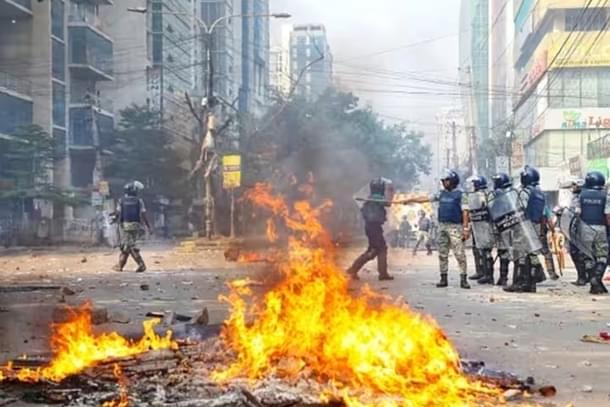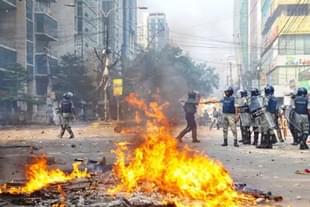World
Continuing Pre-Poll Violence In Bangladesh Provides Advantage To Ruling Awami League
Jaideep Mazumdar
Nov 01, 2023, 06:04 PM | Updated 06:02 PM IST
Save & read from anywhere!
Bookmark stories for easy access on any device or the Swarajya app.


The continuing violence in Bangladesh, induced by the opposition Bangladesh Nationalist Party (BNP) and Jamaat-e-Islami Bangladesh, is turning out to be advantageous for the ruling Awami League.
The bloodshed and ongoing shutdown — the BNP, Jamaat, and smaller opposition parties called for a three-day road, rail, and waterway blockade starting Tuesday (31 October) — in the country angered even those inclined to support the BNP.
The Awami League, which was facing considerable anti-incumbency after being in power for nearly 15 years, is now heaving a sigh of relief.
The anti-incumbency, the ruling party believes, is being washed away due to the violence, arson, and shutdowns that the country is being convulsed with since the start of the BNP rally in Dhaka last Saturday (28 October).
The general perception in Bangladesh is that the BNP, aided from behind the scenes by the Jamaat, is responsible for the violence.
Four persons, including a policeman, died in the violence Saturday and three more died Sunday (29 October) when the BNP and Jamaat called for a ‘hartal’ in protest against police action Saturday on BNP rallyists. Two persons died Tuesday.
The BNP had been holding rallies peacefully across the country over the past few months to demand that the forthcoming elections to the Jatiya Sansad (the country’s parliament) be held under the leadership of a caretaker government.
The Awami League has rejected this demand outright. The BNP’s rallies had garnered considerable public support, and overall opinion in the country was building up in favour of the BNP.
BNP leader Shamsuddin Didar, a member of party chairperson Khaleda Zia’s media relations team, told Swarajya from Dhaka that the BNP had succeeded in mobilising public opinion against the ruling Awami League.
“Our rallies were peaceful and we were getting a lot of support from the masses, who are fed up with the misrule and corruption that have become endemic under the Awami League. People want change,” claimed Didar.
His views are echoed by even Awami League supporters. “Fifteen years is a long time, and a lot of anti-incumbency had expectedly built up.
"The government made some mistakes and, thanks to global issues, our economy is not in a very good shape. Prices have skyrocketed and the BNP had succeeded in mobilising public opinion against the government.
"Also, the perception that the BNP is the underdog had gained ground and generated considerable sympathy in favour of the principal opposition party,” admitted columnist and social entrepreneur Rafiqur Rehman, who is avowedly pro-Awami League.
But Saturday’s violence changed it all. “The violence last Saturday, and the subsequent response of the BNP-Jamaat — calling a ‘hartal’ the next day and a three-day transport strike from Tuesday — has alienated the masses and made them angry. People don’t want violence and disruptions,” said Rehman.
This perception is shared by many in the BNP. “Though the police attacked our activists and broke up our rally, we are being unfairly blamed for the violence. In public perception, we are at fault since we gave a call for the (28 October) rally that resulted in large-scale violence and arson,” said BNP executive committee member Ishraque Hossain.
According to Golam Mortoza, editor of the Bengali edition of The Daily Star (the largest-circulated English daily in Bangladesh), the Awami League laid a trap into which the BNP fell.
“A political movement like the one launched by the BNP (demanding that Sheikh Hasina steps down to pave the way for a caretaker government) requires farsightedness and extreme caution.
"The BNP should have remembered that any violence that comes with a movement gets associated with the party that called for the movement in the first place. The BNP cannot evade responsibility for the violence,” said Mortoza.
Awami League leaders used provocative language against the BNP, according to Mortoza, and used the police to incite BNP cadres.
“BNP leaders should have devised foolproof crowd-control strategies and kept a firm grip on their cadres and stopped them from getting provoked. But they failed to do so,” he said.
With BNP chairperson Khaleda Zia under prolonged house arrest, her son and acting chairperson, Tarique Rahman, in exile in London, and secretary general Mirza Fakrul Islam Alamgir and almost the entire top leadership in prison or having gone underground, people fear that the BNP’s movement will turn more violent.
“The party is currently leaderless and the fear is that the Jamaat will hijack the BNP and instigate the BNP cadres to indulge in violence and arson. BNP cadres are rudderless now and that’s a dangerous situation,” said political analyst Anwar Farukh Tuku, a professor of political science at a private university in Dhaka.
The Awami League is expectedly happy at this turn of events. “We have always said that a tiger cannot change its stripes. The BNP believes in violence and uses violence for achieving its political ends.
"Violence is embedded in its DNA and the bloodshed and arson over the last few days only proves this (point),” Awami League joint general secretary Dr Hassan Mahmud told Swarajya.
Awami League presidium member Shahjahan Khan, who is also a parliamentarian, told Swarajya:
“The more the BNP cadres indulge in violence, the more public support it will lose. The violence and arson by the BNP-Jamaat since Saturday have brought back dark memories of the turmoil during the BNP-sponsored shutdown of 2015.
"People do not want disruption, and even BNP supporters have realised that the Awami League is the only party that can guarantee peace and stability, which is a prerequisite for progress and prosperity."
The Awami League is leaving no stone unturned in driving home the point that the country has been plunged into turmoil in the aftermath of the rally called by the BNP last Saturday.
Prime Minister Sheikh Hasina and her ministers have launched a high-decibel campaign against the BNP, even terming it a "party of terrorists."
The ruling party has undertaken a publicity blitz aimed at equating the BNP with anarchy. Unfortunately for the BNP, and due to its own follies, the Awami League campaign is meeting with a lot of success.
With the BNP determined to intensify its movement demanding Sheikh Hasina’s resignation and holding the parliamentary elections under a caretaker regime, more violence seems inevitable.
That will likely result in greater loss of public sympathy and support for the BNP.
Also Read: Why India Needs To Tell The US To Lay Off The Upcoming Parliamentary Elections In Bangladesh





